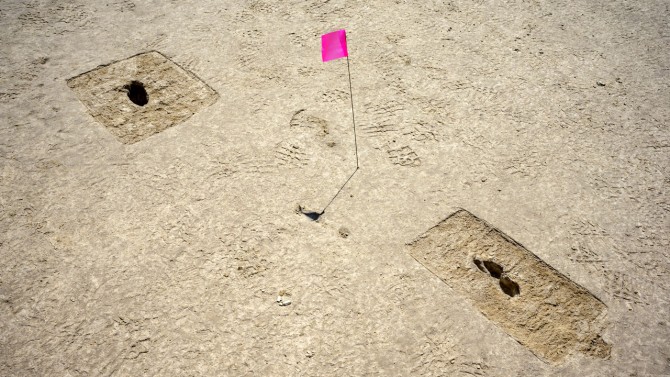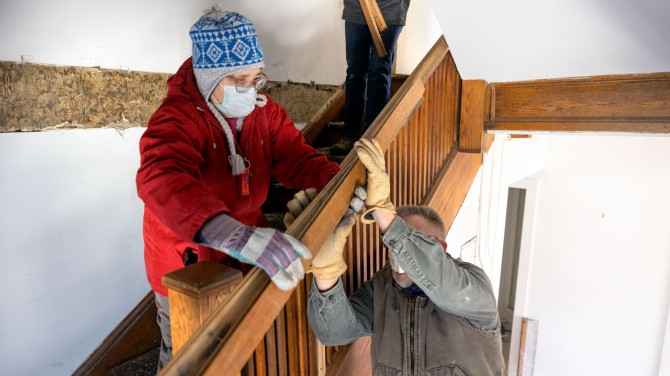For Cornellians in Ithaca and around the world, 2022 was a year full of ideas, learning and connections. This year we explored our passions and celebrated our community with curiosity, innovation and creativity.
Top stories of 2022: COVID solutions, student heroics
By Tom Fleischman, Cornell Chronicle
The first recorded proof of a bird not seen for 140 years, a gut bacteria that could regulate cholesterol and a senior who risked his own life to rescue a man from an oncoming subway train were among the topics of the most-read Cornell Chronicle stories of 2022.
In a sign of increasing normalcy, only one story in the Chronicle’s top 10 concerned COVID: a promising nasal spray that could both prevent and treat the virus. A story tangentially related to the virus – how the pandemic sent many New York City residents to suburbs and upstate – came in at No. 15. In 2020, four of the Chronicle’s top five stories were pandemic-related.
The nasal spray was among eight top stories relating to groundbreaking research. Of the top 10, the only non-research articles were on the nation’s first Black fraternity building a monument at its downtown Ithaca birthplace (No. 7); and the heroism of Bryce Demopoulos ’23 (No. 9).
The Chronicle publishes approximately 1,500 stories in a year. Here is a rundown of the past 12 months’ most popular stories, according to Google Analytics data.
Top stories
A research group led by Hector Aguilar-Carreno, associate professor of virology (College of Veterinary Medicine), reported March 28 in Nature on mice engineered with human receptors for the SARS-CoV-2 virus on their cell surfaces. The research revealed that a molecule, N-0385, inhibited entry of the virus, both protecting mice from infection prior to exposure and offering effective treatment when administered up to 12 hours after exposure. As of Dec. 15, the story attracted more than 45,300 views.
Running a distant second this year, at just over 31,400 views, is a story from Nov. 2 from researchers at Weill Cornell Medicine on how inulin, a type of dietary fiber commonly used in health supplements and known to have certain anti-inflammatory properties, can also promote an allergy-related type of inflammation in the lung, gut and other parts of the body. The inflammation evolved as a defense against parasitic worm infection, but inappropriate activation is thought to underlie allergies, asthma and other inflammatory diseases.
College of Arts and Sciences research scientist Thomas Urban discovered human footprints believed to date from the end of the last ice age, around 12,000 years ago, in the sand of an Air Force facility in Utah. That story, from July 28, has attracted more than 29,900 views, third-most this year – around 200 views ahead of a story from Nov. 17 about a September expedition to Papua New Guinea, co-led by Lab of Ornithology postdoctoral researcher Jordan Boersma, that confirmed via video the existence of the black-naped pheasant pigeon, a critically endangered species that had not been reported for 140 years.
The No. 5 story for 2022 relates to sustainability, a high priority topic for Cornell research. Charles Greene, professor emeritus of earth and atmospheric sciences (College of Agriculture and Life Sciences), led a team studying using onshore algae farms to increase food production for a growing global population with limited arable land. That story has attracted more than 26,750 views.
Rounding out the top 10 for 2022:
- A story from Aug. 18 about research into a certain type of gut bacteria that regulate cholesterol;
- A story from May 5 on the nation’s first Black fraternity, Alpha Phi Alpha, building a monument at its downtown Ithaca birthplace;
- A story from Oct. 21 on how butterfly wing patterns are manipulated by non-coding regulatory DNA to create the diversity seen in different species;
- A story from Aug. 6 on Demopoulos, a CALS senior who saw a man “half fall, half stumble” onto New York City subway tracks and jumped down to rescue him, just seconds before an incoming train pulled into the station. The harrowing incident was caught on video; and
- A story from July 12 on how smart thermostats may actually be prompting inadvertent, widespread energy-demand spikes on the power grid.
Through Dec. 15, the Chronicle’s top 22 stories all attracted at least 10,000 views.
Other highlights
Other notable stories from the past 12 months:
Skating to silver: Karen Chen ’23, a human development major in the College of Human Ecology, took fourth place in the individual free skate at the Beijing Olympics in early February, helping the U.S. to a silver medal in the team competition.
Drilling for sustainability: Drilling began June 21 on the 2-mile-deep Cornell University Borehole Observatory, which inform a proposed plan to warm the Ithaca campus with Earth Source Heat. Drilling for the project, launched with a $7.7 million grant from the Department of Energy, concluded Aug. 13; data collected from the observatory was promising, experts reported three months later.
3D-printed body part: A human received a 3D-bioprinted ear implant grown from the patient’s own living cells, thanks to a technology platform developed by a Cornellian-founded startup, 3DBio Therapeutics, co-led by Cornell Engineering professor Lawrence Bonassar.
Memorialized: We reported in October that two iconic Cornellians woven indelibly into the fabric of American history – the late Nobel Prize-winning author Toni Morrison, M.A. ’55, and the late Supreme Court Justice Ruth Bader Ginsburg ‘54 – will each be commemorated in 2023 with a postage stamp. The two have already been honored on Ithaca’s North Campus with residence halls bearing their names.
Unbuilding better: Among numerous feature stories the Chronicle posted was one about a local deconstruction project, spearheaded by assistant professor Felix Heisel of the College of Architecture, Art and Planning, and supported by a grant from the David M. Einhorn Center for Community Engagement. The project serves as a local case study promoting a more sustainable approach to building materials – reusing them, as opposed to putting them in a landfill.
Notable passings
Anne R. Kenney, university librarian emerita and a charismatic visionary who led Cornell University Library through a decade of transformation and growth, died Feb. 5 at age 72.
Charles R. “Chuck” Lee ’61, one of Cornell’s most active and generous ambassadors and a tireless advocate for deeper connections across its campuses and alumni communities, died May 13 at age 82.
Juris Hartmanis, founding chair of Cornell’s Department of Computer Science and a Turing Award-winning pioneer who was instrumental in establishing computer science as an independent field, died July 29 at age 94.
James Turner, professor emeritus of African and African American Politics and Social Policy (A&S), founding director of the Africana Studies and Research Center and a pioneer of the multidisciplinary approach to exploring the African diaspora, died Aug. 6 at age 82.
Patricia “Pat” Carry Stewart ’50, a trustee emerita, presidential councillor and longtime supporter of the university who was instrumental in the founding of the President’s Council of Cornell Women, died Aug. 10 at age 94.
Sherry F. Colb, the C.S. Wong Professor of Law, a pioneering and beloved legal scholar and prolific writer on constitutional criminal procedure, animal rights and sexual equality, died Aug. 25 at age 56.
Kurt Gottfried, Cornell physics professor emeritus, author of a classic text on quantum mechanics, co-founder of the Union of Concerned Scientists and a famously caring colleague and mentor, died Aug. 25 at age 93.
Frank Drake ’51, a Cornell astronomy professor from 1964-84, during which time he served as Cornell’s director of the Arecibo Observatory in Puerto Rico and inspired millions of people to share his passion for finding life on other planets, died Sept. 2 at age 92.
Robert J. “Bob” Appel ’53, a vice chair of Weill Cornell Medicine’s Board of Fellows, Cornell trustee emeritus, presidential councillor and esteemed benefactor of the Ithaca and Weill Cornell campuses, died Nov. 19 at age 91.
Media Contact
Get Cornell news delivered right to your inbox.
Subscribe




